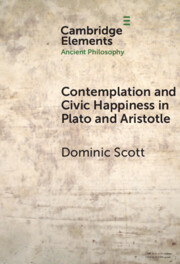Element contents
Contemplation and Civic Happiness in Plato and Aristotle
Published online by Cambridge University Press: 19 December 2024
Summary
- Type
- Element
- Information
- Series: Elements in Ancient PhilosophyOnline ISBN: 9781009372602Publisher: Cambridge University PressPrint publication: 19 December 2024

